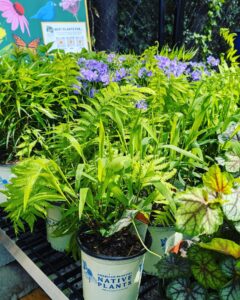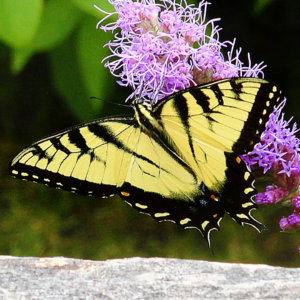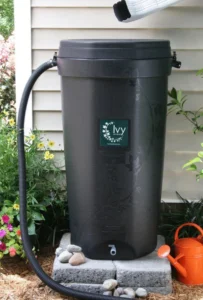In honor of Earth Day, we’re sharing ten steps you can take to make your garden more sustainable and Earth-friendly. You’ll notice that many of these tips are linked to each other. For example, if you mulch or add compost to your garden, your plants will require less water and will thrive much more easily in the summer heat. If those plants are native, they’ll provide food for pollinators, which in turn increases garden yields and health. In nature, everything is related, which means even small steps you take today will help the environment and our Earth.
 Choose native plants. When you grow native plants, you help create a habitat and food source for native insects, birds, and other wildlife, thereby helping to preserve biodiversity. Native plants have evolved for our growing conditions. Their demands on water, fertilizers, and pest control is far less than non-native species. They’re also more likely to be a gardening success. It’s a win-win-win!
Choose native plants. When you grow native plants, you help create a habitat and food source for native insects, birds, and other wildlife, thereby helping to preserve biodiversity. Native plants have evolved for our growing conditions. Their demands on water, fertilizers, and pest control is far less than non-native species. They’re also more likely to be a gardening success. It’s a win-win-win!
Compost. Composting kitchen scraps helps to protect the environment by reducing methane emissions from landfills. Aged compost is a gardener’s gold, providing nutrients, improving water retention, and bringing beneficial organisms and fungi to your soil.
Water wisely. Water in the morning, when plants are less stressed and therefore need less water. Check the soil. Do your plants need water at all? You might be able to skip a day. Water the base of plants when possible–it will not only direct the water to the root zone, it will help prevent fungal diseases, which often crop up when moisture collects on foliage.
Mulch. This goes hand in hand with composting and watering wisely. A thick layer of mulch will help prevent weeds and aid greatly in moisture retention by preventing evaporation at the soil surface. In many instances, top-dressing with compost will act as a sort of mulch, helping prevent weeds and aiding in moisture retention. Be sure to pull mulch at least an inch away from the main stem/trunk of your plants. This will help to ensure that they dry completely between watering and rain events and help to ensure that they don’t rot.
 Welcome wildlife. Make your yard a welcoming place for insects, birds, and other wildlife by providing water, shelter, and food. This doesn’t always mean a fully-stocked bird feeder, bee houses, and a well-tended bird bath (although none of those things hurt). It can be as simple as using native plants,
Welcome wildlife. Make your yard a welcoming place for insects, birds, and other wildlife by providing water, shelter, and food. This doesn’t always mean a fully-stocked bird feeder, bee houses, and a well-tended bird bath (although none of those things hurt). It can be as simple as using native plants,
Consider alternatives to grass. A typical fescue lawn requires a lot of water, fertilizer, weed control and maintenance. Quite frankly, it’s a lot of work and by the middle of the summer, most lawns don’t look that great. Consider transitioning poor-performing parts of your lawn with clover, creeping thyme, or other ground covers. They can add a lovely meadow-like appearance, pollinators love them, and they can be soft under-foot and smell good, too. Talk to us about your options.
Collect rainwater. First off, it’s free! A rain barrel is great, but you can also simply place containers outside when it rains. (Just be sure to use the water immediately to prevent mosquito breeding.) Rainwater is best for your garden, as it contains trace minerals that are beneficial and is devoid of any chemicals from water treatment. Rainwater is also fantastic for your houseplants.
 Take advantage of your garden’s micro-climates. Rather than merely looking at the aesthetics of your garden design and layout, consider the conditions Mother Nature has provided and use those for your best-ever garden results. Put shade-loving plants in shady areas, place water-loving plants in low-lying/slow draining areas, and plant drought-resistant plants in fast-draining and higher spaces.
Take advantage of your garden’s micro-climates. Rather than merely looking at the aesthetics of your garden design and layout, consider the conditions Mother Nature has provided and use those for your best-ever garden results. Put shade-loving plants in shady areas, place water-loving plants in low-lying/slow draining areas, and plant drought-resistant plants in fast-draining and higher spaces.
Fight pests, weeds, and disease organically. Too many conventional pest, weed, and disease controls put pollinators, wildlife, and other plants at risk. They can even harm humans and pets. There are ways to tackle these garden challenges without the use of harmful chemicals. We carry a wide array of organic controls and our team is always happy to consult with you about the best solution for your particular garden.
 Use Organic Fertilizers. Organic fertilizers release nutrients more slowly than their synthetic counterparts. This is good because your plants will still receive the nutrients they need with much lower risk of “burning” them. Many organic fertilizers also contain beneficial microbial life to help maintain soil health. Healthy soil is the key to everything in organic gardening.
Use Organic Fertilizers. Organic fertilizers release nutrients more slowly than their synthetic counterparts. This is good because your plants will still receive the nutrients they need with much lower risk of “burning” them. Many organic fertilizers also contain beneficial microbial life to help maintain soil health. Healthy soil is the key to everything in organic gardening.
We hope that these suggestions are helpful. While it can seem overwhelming at first, pick a couple that you are most comfortable with and start there. You can always build momentum from there!
Happy Organic Gardening!

Leave a Reply